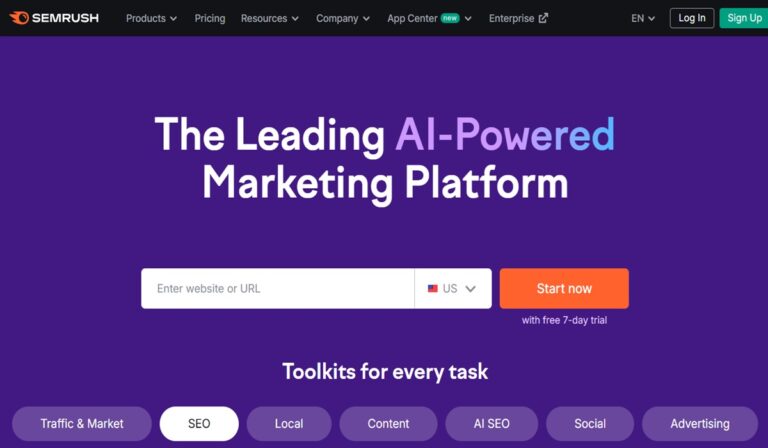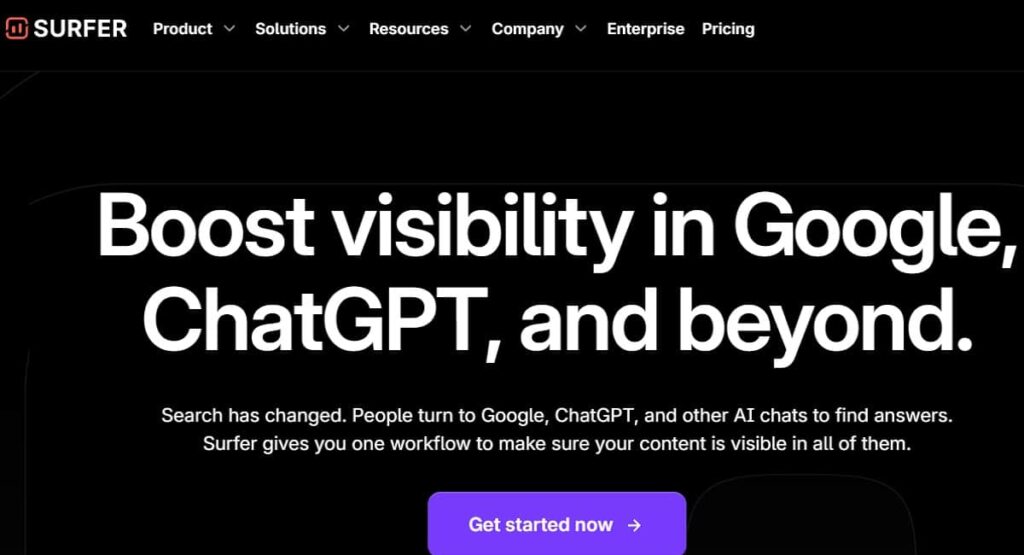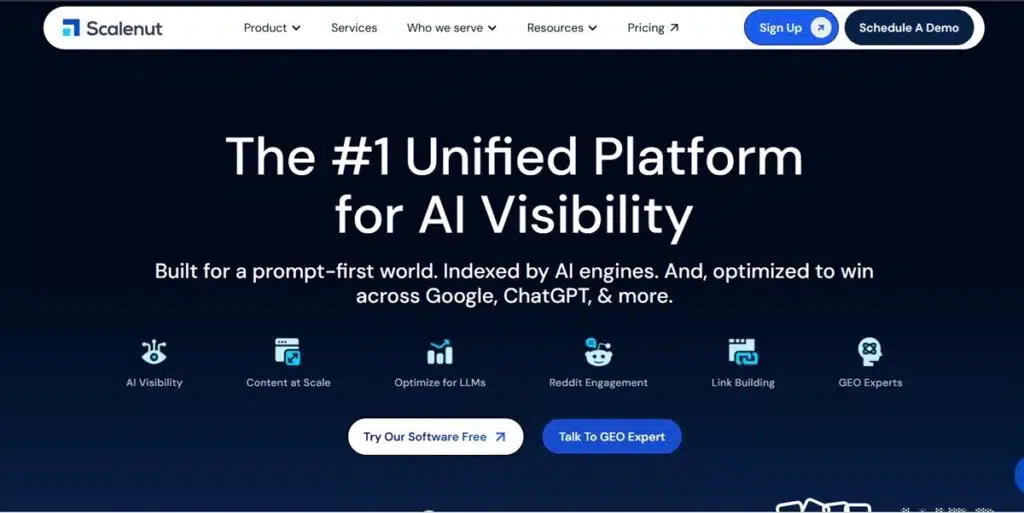Last updated on: 2 months ago
Key Takeaways
- All-in-One Powerhouse: Semrush has evolved into a comprehensive digital marketing suite with over 55 tools for SEO, content marketing, PPC, social media, and competitive analysis.
- Data-Driven Decisions: With a massive database of over 25 billion keywords across 140+ countries, Semrush provides deep, actionable insights for building a robust content strategy and SEO campaign.
- Pricing Considerations: Semrush plans have seen updates, with the core SEO toolkit starting at $139.95 per month. While a significant investment, its ROI can be substantial for agencies, serious marketers, and businesses that fully utilize its features.
- Market Leader: Despite strong competition from tools like Ahrefs, Semrush holds its position as a top choice for its breadth of features, particularly for those managing multi-channel marketing efforts.
- Adapting to AI Search: As AI continues to reshape SEO in 2025, Semrush’s tools for content optimization and competitor analysis are crucial for gaining visibility in AI Overviews and new search formats.
Semrush Review 2025: The All-in-One Digital Marketing Platform?
The world of digital marketing is in constant motion. With the rise of AI-powered search and ever-smarter algorithms, the tools we rely on need to be more powerful and adaptable than ever. For years, Semrush has been a dominant force, hailed as the Swiss Army knife for SEO professionals. But as we navigate 2025, a critical question emerges: has it become something more?
This isn’t just another feature list. This is a deep-dive Semrush review 2025, born from years of in-the-trenches experience. We’ll dissect its massive toolkit, scrutinize the Semrush pricing 2025, and deliver a clear verdict on whether this platform is the right investment for you. The big question is no longer just about SEO; it’s whether Semrush is the all-in-one digital marketing platform you need to win. Let’s find out.
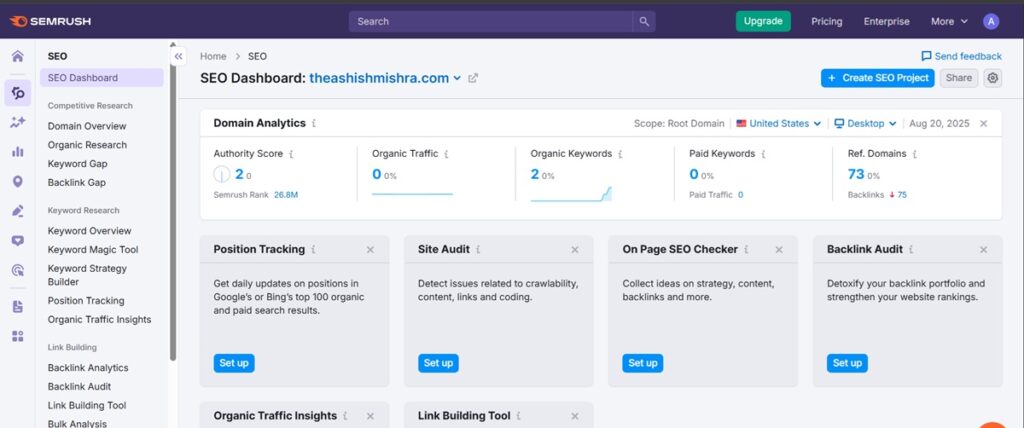
What is Semrush? A Quick Definition
Semrush is an all-in-one digital marketing platform designed to give you a competitive edge online. It’s not just an SEO tool; it’s a comprehensive suite that provides data and tools for SEO, content marketing, competitor research, pay-per-click (PPC) advertising, and social media management. Think of it as your command center for understanding and improving your online visibility.
Initially famous for its keyword and competitor analysis features, Semrush has expanded dramatically. It now boasts over 55 specialized tools, helping marketers with everything from technical site audits to crafting AI-optimized content.
Core Features: The Engine Room of Semrush
Semrush’s power lies in its interconnected toolkits, which have been reorganized for a much cleaner user experience. Let’s break down the core components that make it a go-to for digital marketers.
The SEO Toolkit: Your Foundation for Growth
This is the heart of Semrush and where most users spend their time. It’s a robust collection of tools designed to cover every aspect of your SEO campaign.
Effective SEO starts with understanding what your audience is searching for. Semrush’s Keyword Magic Tool is a beast, offering access to a database of over 25 billion keywords.
Here’s how it empowers your keyword research tool workflow:
- Find Untapped Opportunities: Start with a “seed” keyword, and the tool generates millions of related terms, questions, and long-tail variations you might have missed.
- Analyze Key Metrics: For each keyword, you get crucial data like search volume, keyword difficulty, cost-per-click (CPC), and the level of competition.
- Filter with Precision: You can filter results by search intent (informational, transactional, etc.), language, or even by specific SERP features like featured snippets.
For example, a food blogger could type in “healthy meal planning” and instantly discover question-based keywords like “how to make a meal plan on a budget,” which are perfect for creating targeted, valuable content.
Understanding what your competitors are doing right is one of the fastest ways to grow. The Semrush competitor analysis tools are second to none for this.
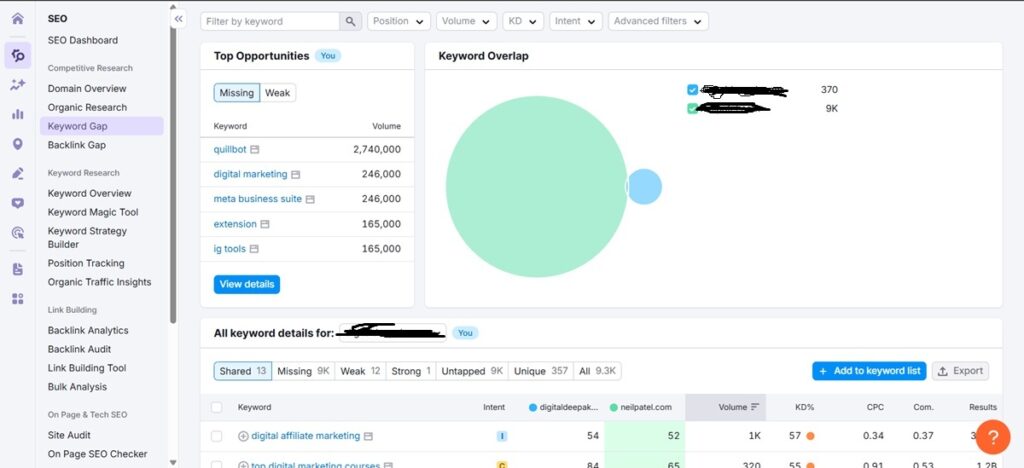
You can:
- Identify Your True Competitors: Discover who is actually competing with you in the SERPs for your target keywords.
- Uncover Their Top Pages: See which of their pages are driving the most organic traffic—a goldmine for content ideas.
- Analyze Keyword Gaps: Find valuable keywords your competitors are ranking for, but you aren’t. This is a direct roadmap for your content strategy.
- Examine Backlink Profiles: Use the Backlink Gap tool to find websites linking to your competitors but not to you, providing a ready-made list for your link-building outreach.
Technical SEO issues can silently kill your rankings. The Semrush site audit tool is your first line of defense, scanning your website for over 140 technical and on-page SEO problems.
Key benefits include:
- Comprehensive Crawling: It checks for everything from broken links and improper redirects to duplicate content and slow page speeds.
- Prioritized Fixes: The tool provides a “Health Score” and organizes issues by severity (Errors, Warnings, Notices), so you know exactly what to fix first.
- Actionable Advice: It doesn’t just point out problems; it provides clear recommendations on how to fix them.
Think of it like a routine check-up for your website, ensuring it’s in peak condition for both users and search engines like Google.
You can’t improve what you don’t measure. The Position Tracking tool lets you monitor your daily rankings for a specific set of keywords across different devices and locations. This is essential for tracking the success of your SEO campaign and making data-backed adjustments.
The Content Toolkit: From Idea to Optimized Post
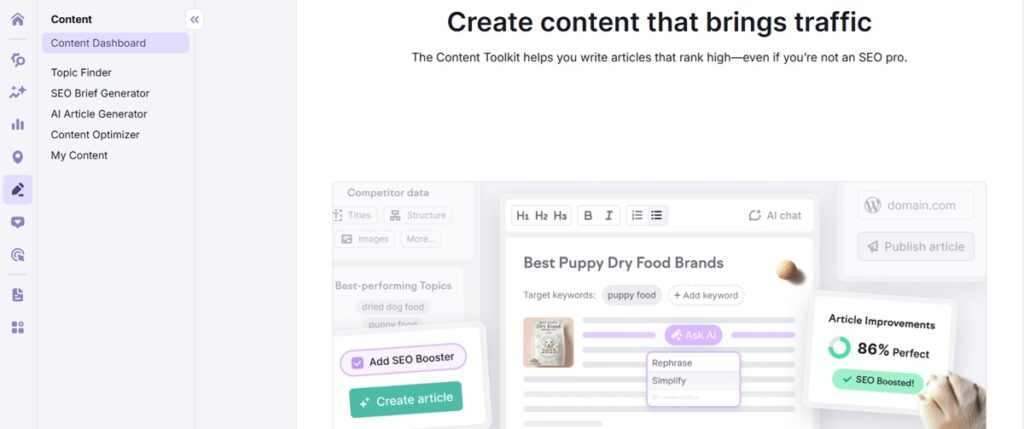
Great content is the fuel for any successful digital marketing strategy. The Semrush Content Toolkit is designed to streamline the entire content creation process.
This toolkit helps you:
- Find Trending Topics: The Topic Research tool generates content ideas based on a keyword, showing you popular headlines and questions people are asking.
- Create SEO-Optimized Briefs: The SEO Content Template analyzes the top 10 ranking pages for your target keyword and gives you a blueprint for your content, including recommended keywords, readability score, and text length.
- Write in Real-Time: The SEO Writing Assistant (available as a Google Docs add-on) checks your text as you write, ensuring it’s optimized, original, and matches your desired tone of voice.
- Audit Existing Content: Identify which of your existing articles need to be updated, rewritten, or removed to improve your overall site performance.
Other Powerful Toolkits
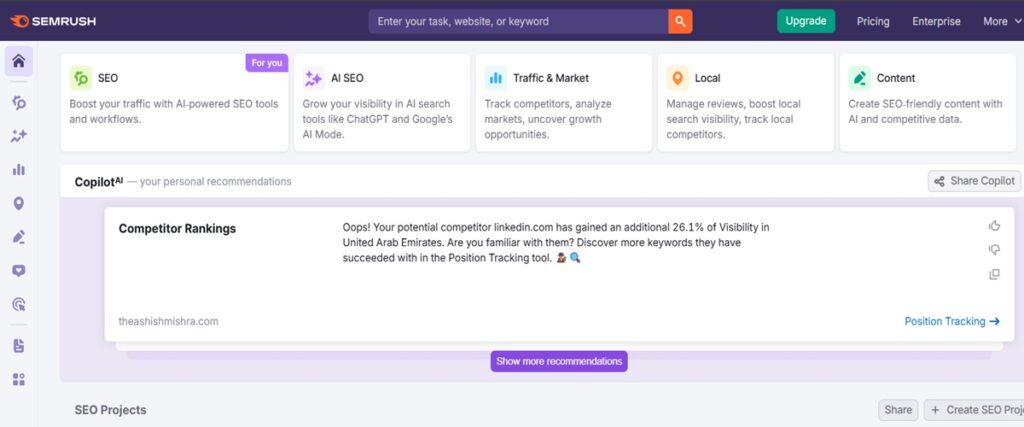
Beyond SEO and content, Semrush extends its capabilities to other critical areas of digital marketing:
- Advertising Toolkit: A must for anyone running PPC campaigns. It lets you analyze competitors’ ad copy and strategies, research keywords for Google Ads, and optimize your ad spend.
- Social Media Toolkit: Schedule posts, monitor brand mentions, and analyze the performance of your social media profiles from one dashboard.
- Local SEO Toolkit: Essential for brick-and-mortar businesses. Manage your Google Business Profile listings, track map rankings, and handle reviews.
Putting Semrush to Work: A Mini-Playbook
Understanding features is one thing, but seeing how they drive results is what matters. In this semrush review 2025, we’ll move past the feature list and look at a few practical, high-impact plays you can run with Semrush to get a tangible return on your investment.
Every SEO campaign needs quick wins to build momentum. The goal here is to find keywords that have decent search volume but relatively low competition, making them easier to rank for.
- Step 1: Open the Keyword Magic Tool and enter a broad topic relevant to your business (e.g., “content marketing strategy”).
- Step 2: Apply two crucial filters. Set the Keyword Difficulty (KD%) to “Easy” or “Very Easy” (under 30%). Then, set the search volume to a minimum that makes sense for your niche (e.g., greater than 100).
- Step 3: Use the “Questions” filter. This will instantly show you what your audience is actively asking.
- Result: You’ll get a list of highly relevant, low-competition keywords like “how to measure content marketing roi” or “best content marketing examples for b2b” that are perfect targets for your next blog post.
Instead of guessing what works, you can use Semrush to reverse-engineer your competitors’ success.
- Step 1: In the main dashboard, enter a top competitor’s domain name and hit search.
- Step 2: Navigate to the “Organic Research” section and click on the “Pages” tab.
- Step 3: Sort the results by “Traffic.” This will show you their most valuable pages—the ones driving the most organic search traffic to their site.
- Result: You now have a data-backed list of the exact topics and page formats that are proven winners in your niche. Analyze these pages to understand their structure, depth, and the keywords they target, then create something even better.
Semrush Pros and Cons : The Honest Breakdown
No tool is perfect. A balanced view is essential for making a smart investment. After years of using Semrush for countless projects, here’s my honest take on its biggest strengths and weaknesses as we stand in 2025.
- Truly an All-in-One Platform: This is its biggest advantage. The ability to manage your SEO, PPC, content, and social media from a single dashboard is a massive workflow efficiency gain. You don’t need to stitch together 4-5 different tools.
- World-Class Keyword and Competitor Data: The sheer size and accuracy of Semrush’s database are incredible. The insights you can pull from the Keyword Magic Tool and competitor analysis tools are second to none and form the bedrock of any successful digital marketing campaign.
- Exceptional Content Toolkit: Semrush has invested heavily here, and it shows. The SEO Writing Assistant and Topic Research tools are fantastic for bridging the gap between raw data and creating high-ranking, engaging content.
- Constant Innovation and Improvement: Semrush doesn’t rest on its laurels. The platform is constantly updated with new features, better data visualizations, and improved UI elements that genuinely make the tool easier and more powerful to use over time.
- The Steep Price Point: Let’s be direct—Semrush is a significant investment. For freelancers or small businesses just starting out, the monthly cost of the Pro plan can be a major hurdle.
- The “Overwhelming” First Impression: With over 55 different tools, logging in for the first time can feel like stepping into the cockpit of a 747. There is a definite learning curve to mastering the full breadth of its capabilities.
- Backlink Index is a Close Second: While its backlink analysis tools are powerful and more than sufficient for most users, Ahrefs is still widely considered to have a slight edge with a larger and slightly faster-crawled backlink index.
Who is Semrush Really For? (A Breakdown by User)
In this semrush review 2025 we’ll explore the queries like, Is Semrush the right tool for a solo blogger? A massive agency? An in-house team? The answer varies, as different users will extract value from different parts of the platform. Here’s how it stacks up for the main user types.
For an agency, Semrush is practically a necessity. The Guru and Business plans are built for this environment. Features like the Project-based organization, branded PDF reporting, and API access for custom dashboards are indispensable for managing multiple clients. The ability to quickly perform keyword gap analyses and site audits is crucial for both landing new clients and delivering consistent results.
In-house teams will find immense value in the collaborative tools and competitive intelligence features. The Content Toolkit allows content strategists and writers to work from the same data-driven brief. Tools like Market Explorer and Position Tracking provide a 360-degree view of the company’s standing against its key competitors, helping to inform broader business strategy far beyond just SEO.
For a solo operator, the Pro plan is the entry point. While the cost is a major consideration, the investment can pay for itself quickly if used correctly. The core tools—Keyword Magic Tool, Site Audit, and Position Tracking—provide all the essential firepower needed to research content, optimize a website, and track growth. It’s a tool for freelancers who are ready to scale their business from a hobby into a profession.
Semrush Pricing 2025: Is It a Good Investment?
Let’s talk numbers. Semrush pricing 2025 remains a significant consideration for many. It’s a premium tool, and the price reflects its vast capabilities. The core SEO toolkit is offered in three main tiers.
Here’s a simplified breakdown of the plans (billed monthly):
| Plan | Price (Monthly) | Best For | Key Limits |
| Pro | $139.95/month | Freelancers, Startups & Small In-House Teams | 5 Projects, 500 Keywords to Track |
| Guru | $249.95/month | Growing SMBs & Marketing Agencies | 15 Projects, 1,500 Keywords to Track, Content Marketing Toolkit |
| Business | $499.95/month | Large Agencies & Enterprises | 40 Projects, 5,000 Keywords to Track, API Access |
(Note: Prices are based on available data for 2025 and may be subject to change. Opting for annual billing provides a discount of up to 17%).
Additional toolkits for Local SEO, Social Media, and specialized Market Research often come as add-ons.
So, is Semrush worth it in 2025?
For serious digital marketers, agencies, and businesses where online visibility is a critical revenue channel, the answer is a resounding yes. The depth of data, competitor insights, and workflow efficiency it provides can deliver a massive ROI that easily covers the cost.
One of my agency clients uncovered thousands in new sales after spotting a keyword gap Semrush revealed—proof that the right insights really do pay for themselves.
However, for a casual blogger or a very small business on a tight budget with minimal needs, the price can be steep. In that case, starting with their limited free plan or more affordable tools like Ubersuggest might be a better entry point.
Semrush vs Ahrefs 2025: The Heavyweight Battle
No Semrush review is complete without mentioning its biggest rival, Ahrefs. The Semrush vs Ahrefs debate is ongoing because both tools are excellent, but they have different core strengths.
Semrush’s Advantage: It’s an all-in-one marketing suite. If you’re involved in PPC, social media, and broad content marketing alongside SEO, Semrush offers a more integrated solution. Its keyword research tools and content marketing platform are often considered more comprehensive.
Ahrefs’ Advantage: Ahrefs is renowned for its superior backlink analysis. Its crawler is incredibly fast and its backlink index is massive, often making it the preferred tool for pure-play SEOs focused heavily on link building. Its user interface is also praised for being clean and fast.
The Verdict: If you need a comprehensive digital marketing platform, choose Semrush. If your primary focus is hardcore SEO, especially backlink analysis and technical audits, Ahrefs might be a slightly better fit. For backlink hunters, our technical SEO team swears by Ahrefs’ index, but our content strategists rely on Semrush’s robust briefs and topic research. Many agencies, including my own, end up using both to get the best of both worlds.
The Final Verdict: Your All-in-One Platform?
After an exhaustive Semrush review 2025, it’s clear that Semrush remains a top-tier platform and one of the best SEO tools in 2025. More importantly, it has successfully evolved from a pure SEO tool into a complete marketing intelligence platform that can drive a holistic online strategy.
The platform’s strength lies in connecting the dots—showing how your SEO campaign impacts your content strategy, which in turn influences your social and paid efforts. The recent UI improvements have made its vast arsenal of tools much more accessible and user-friendly.
While the price tag means it’s a serious commitment, the value it delivers for dedicated marketers is undeniable. For agencies, mid-to-large businesses, and anyone serious about competing online, Semrush provides the data and features necessary to win. It’s not just a tool; it’s a competitive advantage.
So, is it the all-in-one platform you’ve been looking for? For many who need an integrated solution for SEO, content, and PPC, the answer is a confident yes. It’s powerful, comprehensive, and continues to adapt to the future of search.
Curious how Semrush could transform your marketing results in 2025? Take a test drive with their free trial—it’s the easiest way to spot missed opportunities and see if their powerhouse toolkit belongs in your digital arsenal.
FAQs
1. How much does Semrush cost in 2025?
Semrush’s core SEO toolkit pricing starts at $139.95 per month for the Pro plan. The Guru plan is $249.95 per month, and the Business plan is $499.95 per month. Discounts are available with annual billing, and specialized toolkits can be added for an extra fee.
2. Is there a free version of Semrush?
Yes, Semrush offers a free account with limited functionality. It allows for a small number of data requests per day (e.g., 10 keyword analyses) and a single project, making it suitable for very light or occasional use.
3. Is Semrush better than Ahrefs?
It depends on your needs. Semrush is generally considered better as an all-in-one marketing platform, with stronger features for PPC, social media, and content marketing. Ahrefs is often praised for having a superior backlink index and a more streamlined interface, making it a favorite for pure SEO tasks.
4. How accurate is Semrush’s data?
Semrush is widely regarded as one of the most accurate and reliable tools on the market, trusted by millions of marketing professionals. While no third-party tool can be 100% perfect, its data for keyword volume, traffic estimates, and site audits provides a solid foundation for strategic decisions.
5. What is the Semrush Site Audit tool used for?
The Semrush Site Audit tool scans a website for over 140 technical and on-page SEO issues. It helps you identify and fix problems like broken links, slow pages, duplicate content, and crawlability errors to improve your website’s overall health and search engine rankings.
6. What is included in the Semrush Content Marketing Toolkit?
The toolkit includes several tools to manage your content workflow, such as Topic Research for finding ideas, an SEO Content Template for creating optimized briefs, an SEO Writing Assistant for real-time optimization, and a Content Audit tool for improving existing content.
7. Can Semrush be used for PPC campaigns?
Absolutely. Semrush has a dedicated Advertising Toolkit that allows you to conduct keyword research for PPC, analyze competitors’ ad strategies and budgets, view their live ad copy, and find new advertising opportunities.
8. Is Semrush good for beginners?
While the sheer number of features can feel overwhelming at first, Semrush has made significant strides in improving its user interface. The platform provides plenty of resources and clear reports. Beginners who are serious about learning SEO will find it an invaluable, albeit steep, learning tool.
9. How does Semrush help with a content strategy?
Semrush informs every stage of a content strategy. It helps you find data-backed topics people are searching for, analyze top-ranking content to understand what works, create detailed briefs for writers, optimize the content as it’s being written, and track its performance after publication.
10. Is Semrush’s rank tracking accurate?
Yes, Semrush’s position tracking is highly reliable. It allows you to monitor keyword rankings on a daily basis across different geographic locations and device types (desktop and mobile), giving you a clear picture of your SEO performance over time.
